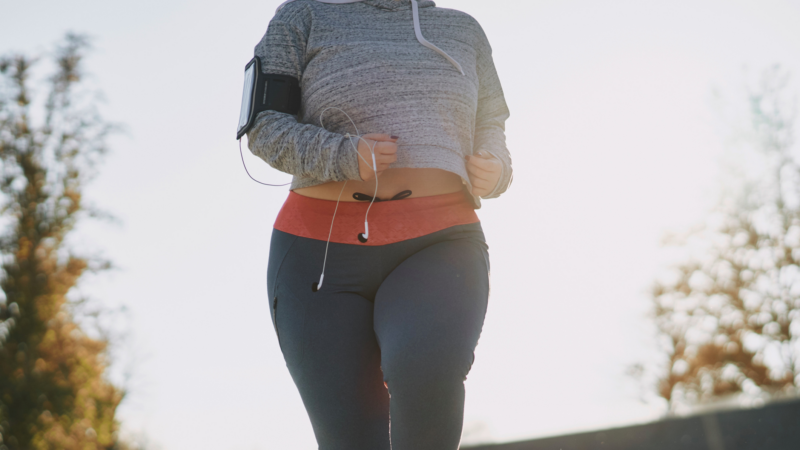People who exercise have healthier belly fat, new study finds
There are lots of good reasons to exercise that have nothing to do with weight loss. Now, science has found yet another one: It turns out that a regular exercise habit can make your fat tissue healthier. And that, in turn, keeps you healthier.
To find out how exercise impacts fat tissue, researchers at the University of Michigan recruited 32 adults with obesity. Half of them were consistent long-term exercisers. They’d been doing aerobic exercise like jogging or biking regularly at least four times a week — for at least two years. The other half of the study group was composed of non-exercisers, but they were otherwise similar to those in the first group in many ways.
“On appearance they looked very similar. They had the same amount of body fat. They carried their body fat in the same manner. They were the same weight,” says Jeff Horowitz, a professor of movement science in the University of Michigan’s School of Kinesiology, who led the study. The subjects were also matched for age and biological sex.
But when the researchers took samples of the subjects’ belly fat tissue from just underneath their skin — known as subcutaneous fat, the kind of fat you can pinch — they found stark differences in the regular exercisers.
“We found that their fat tissue had more blood vessels there, the tissue itself was less rigid. We also found there was less inflammation going on in their fat tissue,” says Cheehoon Ahn, the study’s first author. He conducted the research, which was published in the journal Nature Metabolism, as part of his doctoral dissertation while at the University of Michigan.
Exercisers also had more beneficial proteins in their fat tissue. Ahn says all of those are signs that their subcutaneous fat tissue was much healthier. By contrast, the belly fat tissue from the non-exercisers did not show any of these characteristics.
And there was another important difference. The fat tissue taken from the regular exercisers had a greater capacity to expand and store fat just underneath the skin. Horowitz says that while it may seem counterintuitive, having fat tissue that can expand is actually a good thing.
“People might think, ‘I don’t want my fat cells to expand,’ but if they don’t expand, then that fat is going to go somewhere — and it’s going to go to bad places like the liver and the heart” and other organs, Horowitz says.
This kind of fat is known as visceral fat, and having too much of it can raise the risk of serious health issues such as diabetes and heart disease. The changes seen in the exercisers’ fat tissue may protect them from accumulating this more dangerous kind of fat, says Ahn, who is now a postdoctoral researcher at the AdventHealth Translational Research Institute in Orlando, Florida.
“You know, not all fat is created equal, and it does turn out that location, location, location does actually make a difference” in how fat tissue affects overall health, says Philipp Scherer, director of the Touchstone Diabetes Center at the University of Texas Southwestern Medical Center in Dallas.
Scherer, who was not involved in the study, is a longtime researcher in the role that fat plays in metabolic disease. He says the fat tissue from the exercisers had all the hallmarks of metabolic health. “It’s a nice study, a brilliant study,” he says. “They show very nicely that exercise really is a good thing.”
And that is good news for all of us, because as Horowitz notes, “Almost everyone gains weight as we age, even regular exercisers.”
But Horowitz says if we live a physically active lifestyle, it’s going to help us store that excess fat in a healthier, safer way. It’s one more reminder that there are many benefits to regular exercise, regardless of how it affects the number on the scale.
This story was edited by Jane Greenhalgh.
The latest on the Land Back movement, in which Native American tribes reclaim land
The Land Back Movement is an effort by native Americans to reclaim lost land. Two reporters take a look at where it’s worked and where it hasn’t at reservations in Minnesota.
What the upcoming election looks like for Georgia GOP chairman Josh McKoon
NPR's Mary Louise Kelly talks with Georgia Republican Party chair Josh McKoon in Atlanta ahead of the 2024 presidential election.
Congress votes down spending bill as government shutdown looms
Congress is running out of time to avert a government shutdown. House Republicans will put up a partisan proposal that does not even have enough votes within their own party.
The New Georgia Project aims to reach 1 million residents – one door at a time
NPR's Mary Louise Kelly reports from the swing state of Georgia on efforts to rally Republican and Democratic voters.
In Lebanon, more electronic devices blew up during funerals from Tuesday’s attacks
In Lebanon, funerals took place for a dozen people killed by exploding pagers targeting Hezbollah — but as they buried their dead, more electronic devices blew up, claiming yet more lives.
Here are 4 ways the Federal Reserve’s big rate cut could change the housing market
Here's a look at what the Federal Reserve's rate cut will mean for those looking to buy — or sell — a home.



